Financial Management Report: FDI, Wages, and the ILO's Role
VerifiedAdded on 2021/05/30
|7
|1397
|29
Report
AI Summary
This report delves into the realm of International Financial Management, focusing on Foreign Direct Investment (FDI) and its multifaceted impacts. It explores how FDI, a significant driver of economic development, influences living wages, particularly within developing countries, and the challenges posed by multinational enterprises (MNEs). The report examines the relationship between FDI and the wages of workers, considering the potential benefits and drawbacks, drawing upon the Declaration of Philadelphia and the International Labour Organisation (ILO) to provide a comprehensive overview of the subject. The report also analyses the principles of the Declaration of Philadelphia, emphasizing human rights, freedom of expression, and the importance of addressing poverty on a global scale. The analysis incorporates academic sources to support the arguments and findings.
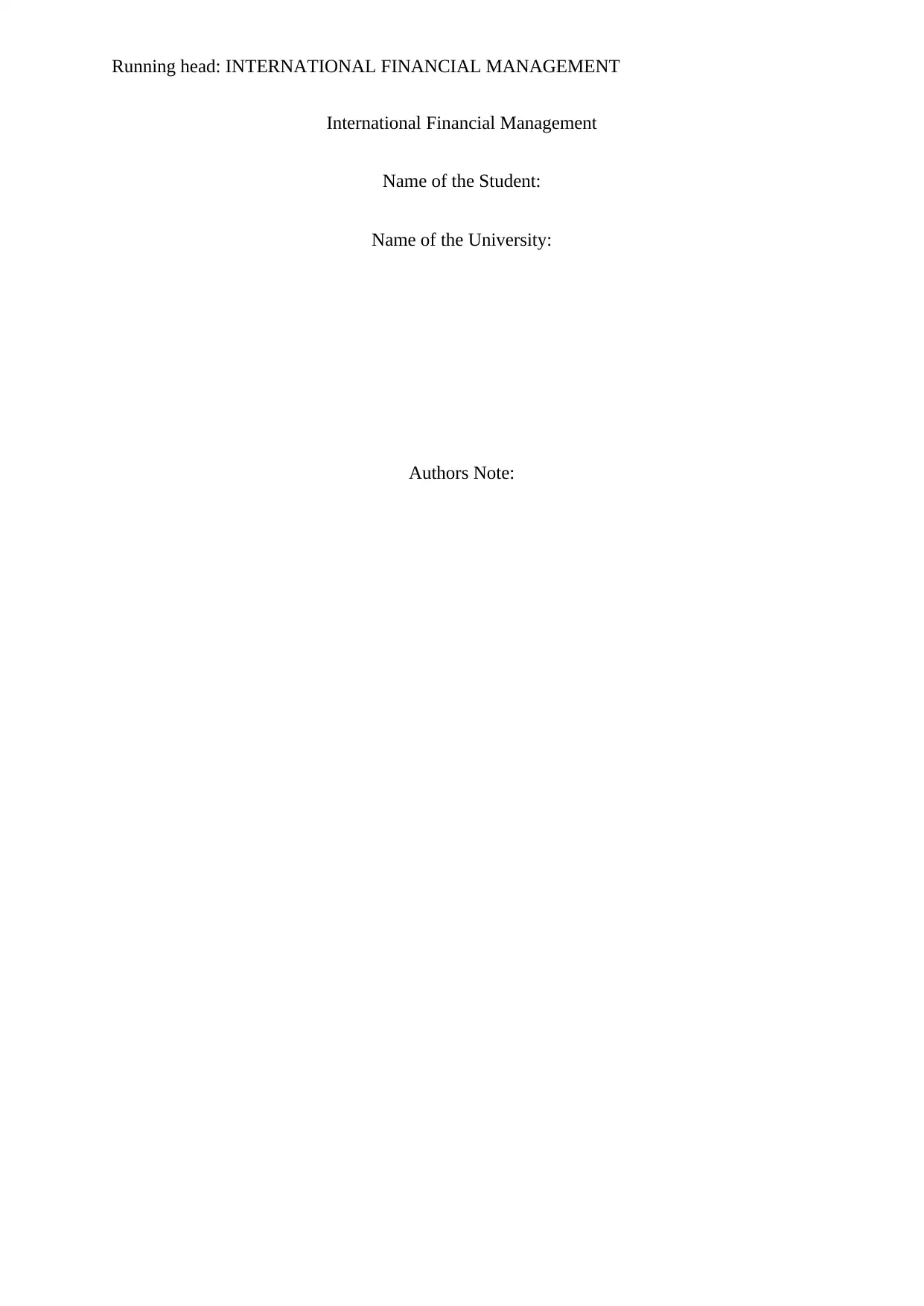
Running head: INTERNATIONAL FINANCIAL MANAGEMENT
International Financial Management
Name of the Student:
Name of the University:
Authors Note:
International Financial Management
Name of the Student:
Name of the University:
Authors Note:
Paraphrase This Document
Need a fresh take? Get an instant paraphrase of this document with our AI Paraphraser
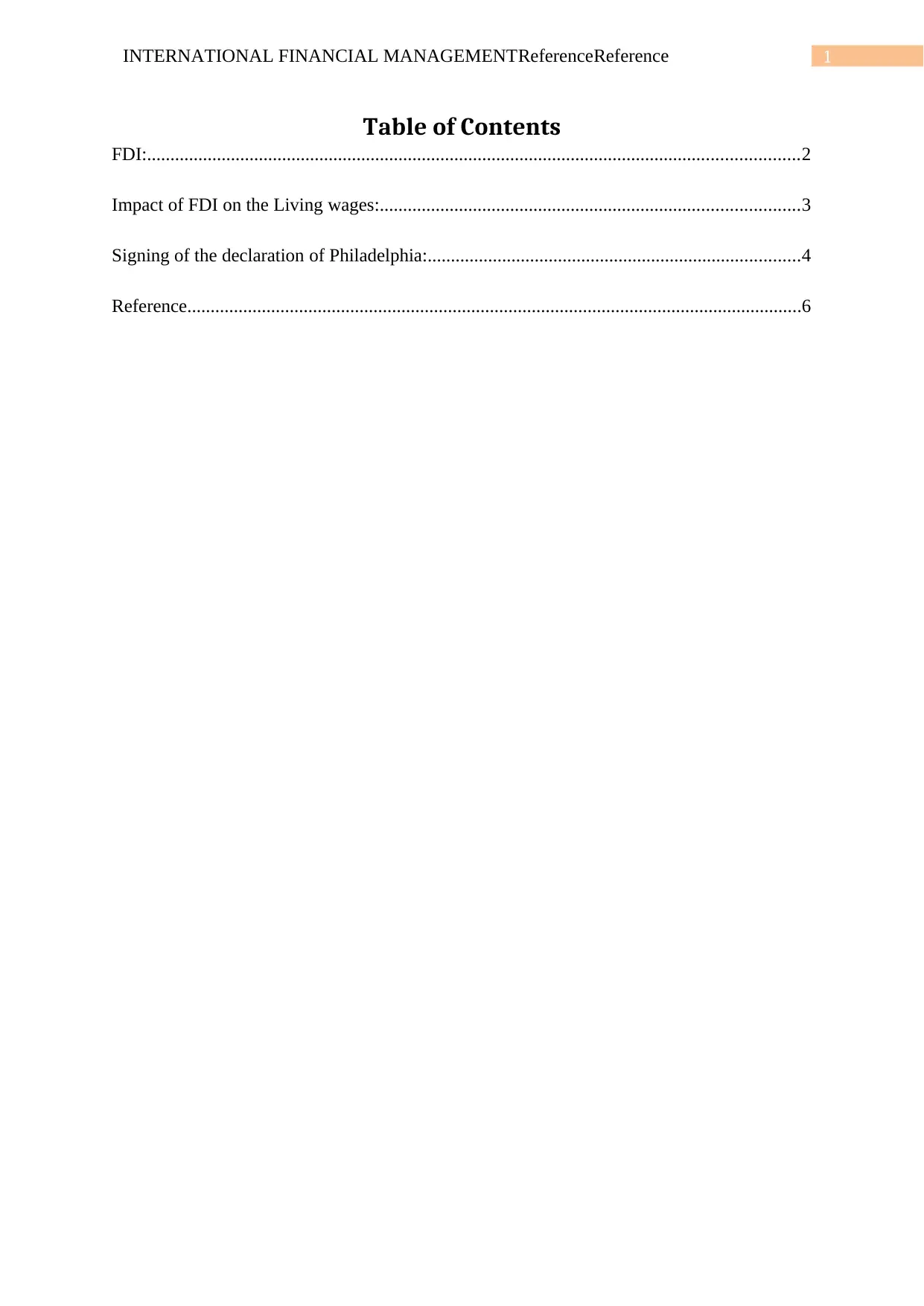
1INTERNATIONAL FINANCIAL MANAGEMENTReferenceReference
Table of Contents
FDI:............................................................................................................................................2
Impact of FDI on the Living wages:..........................................................................................3
Signing of the declaration of Philadelphia:................................................................................4
Reference....................................................................................................................................6
Table of Contents
FDI:............................................................................................................................................2
Impact of FDI on the Living wages:..........................................................................................3
Signing of the declaration of Philadelphia:................................................................................4
Reference....................................................................................................................................6
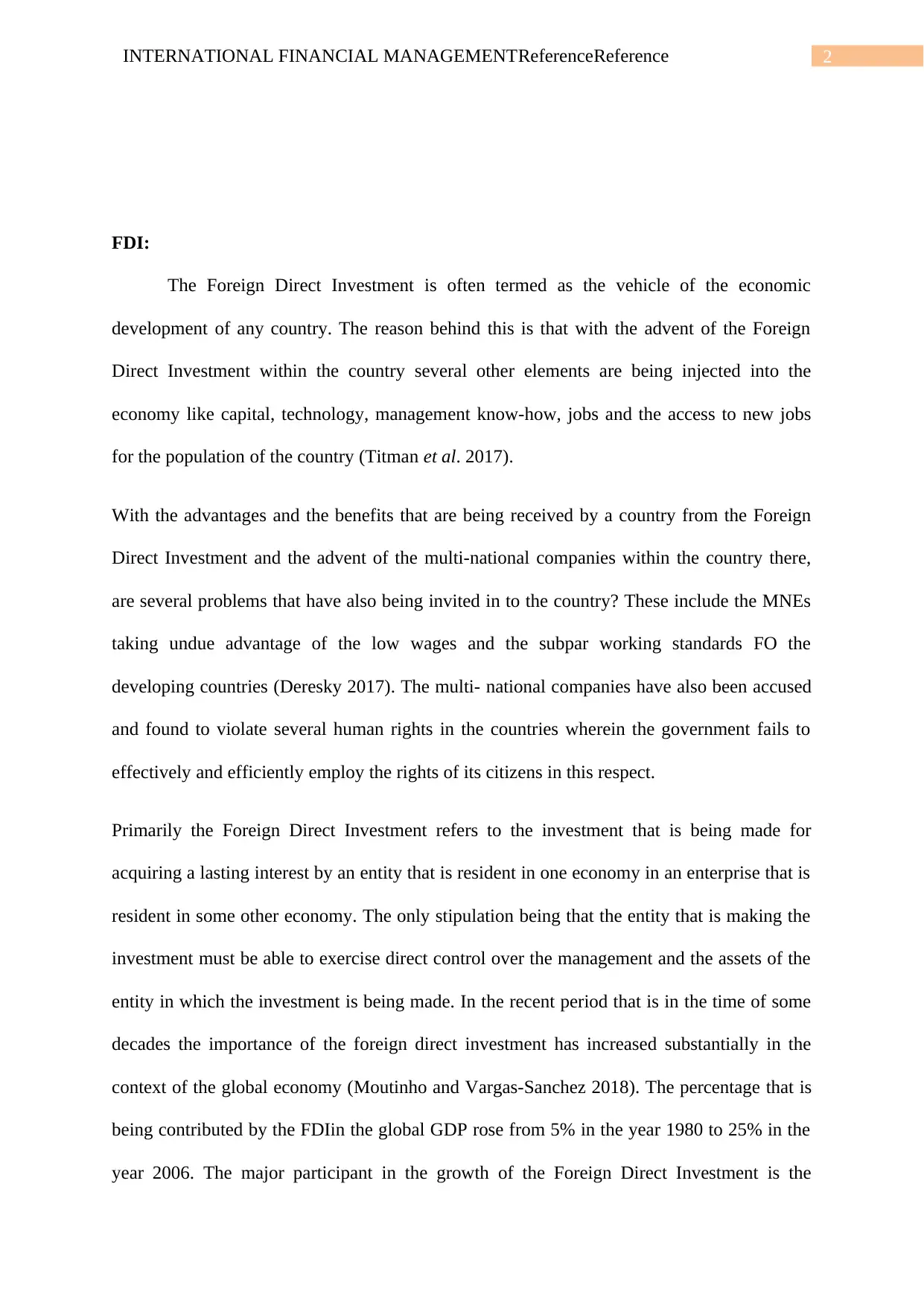
2INTERNATIONAL FINANCIAL MANAGEMENTReferenceReference
FDI:
The Foreign Direct Investment is often termed as the vehicle of the economic
development of any country. The reason behind this is that with the advent of the Foreign
Direct Investment within the country several other elements are being injected into the
economy like capital, technology, management know-how, jobs and the access to new jobs
for the population of the country (Titman et al. 2017).
With the advantages and the benefits that are being received by a country from the Foreign
Direct Investment and the advent of the multi-national companies within the country there,
are several problems that have also being invited in to the country? These include the MNEs
taking undue advantage of the low wages and the subpar working standards FO the
developing countries (Deresky 2017). The multi- national companies have also been accused
and found to violate several human rights in the countries wherein the government fails to
effectively and efficiently employ the rights of its citizens in this respect.
Primarily the Foreign Direct Investment refers to the investment that is being made for
acquiring a lasting interest by an entity that is resident in one economy in an enterprise that is
resident in some other economy. The only stipulation being that the entity that is making the
investment must be able to exercise direct control over the management and the assets of the
entity in which the investment is being made. In the recent period that is in the time of some
decades the importance of the foreign direct investment has increased substantially in the
context of the global economy (Moutinho and Vargas-Sanchez 2018). The percentage that is
being contributed by the FDIin the global GDP rose from 5% in the year 1980 to 25% in the
year 2006. The major participant in the growth of the Foreign Direct Investment is the
FDI:
The Foreign Direct Investment is often termed as the vehicle of the economic
development of any country. The reason behind this is that with the advent of the Foreign
Direct Investment within the country several other elements are being injected into the
economy like capital, technology, management know-how, jobs and the access to new jobs
for the population of the country (Titman et al. 2017).
With the advantages and the benefits that are being received by a country from the Foreign
Direct Investment and the advent of the multi-national companies within the country there,
are several problems that have also being invited in to the country? These include the MNEs
taking undue advantage of the low wages and the subpar working standards FO the
developing countries (Deresky 2017). The multi- national companies have also been accused
and found to violate several human rights in the countries wherein the government fails to
effectively and efficiently employ the rights of its citizens in this respect.
Primarily the Foreign Direct Investment refers to the investment that is being made for
acquiring a lasting interest by an entity that is resident in one economy in an enterprise that is
resident in some other economy. The only stipulation being that the entity that is making the
investment must be able to exercise direct control over the management and the assets of the
entity in which the investment is being made. In the recent period that is in the time of some
decades the importance of the foreign direct investment has increased substantially in the
context of the global economy (Moutinho and Vargas-Sanchez 2018). The percentage that is
being contributed by the FDIin the global GDP rose from 5% in the year 1980 to 25% in the
year 2006. The major participant in the growth of the Foreign Direct Investment is the
⊘ This is a preview!⊘
Do you want full access?
Subscribe today to unlock all pages.

Trusted by 1+ million students worldwide
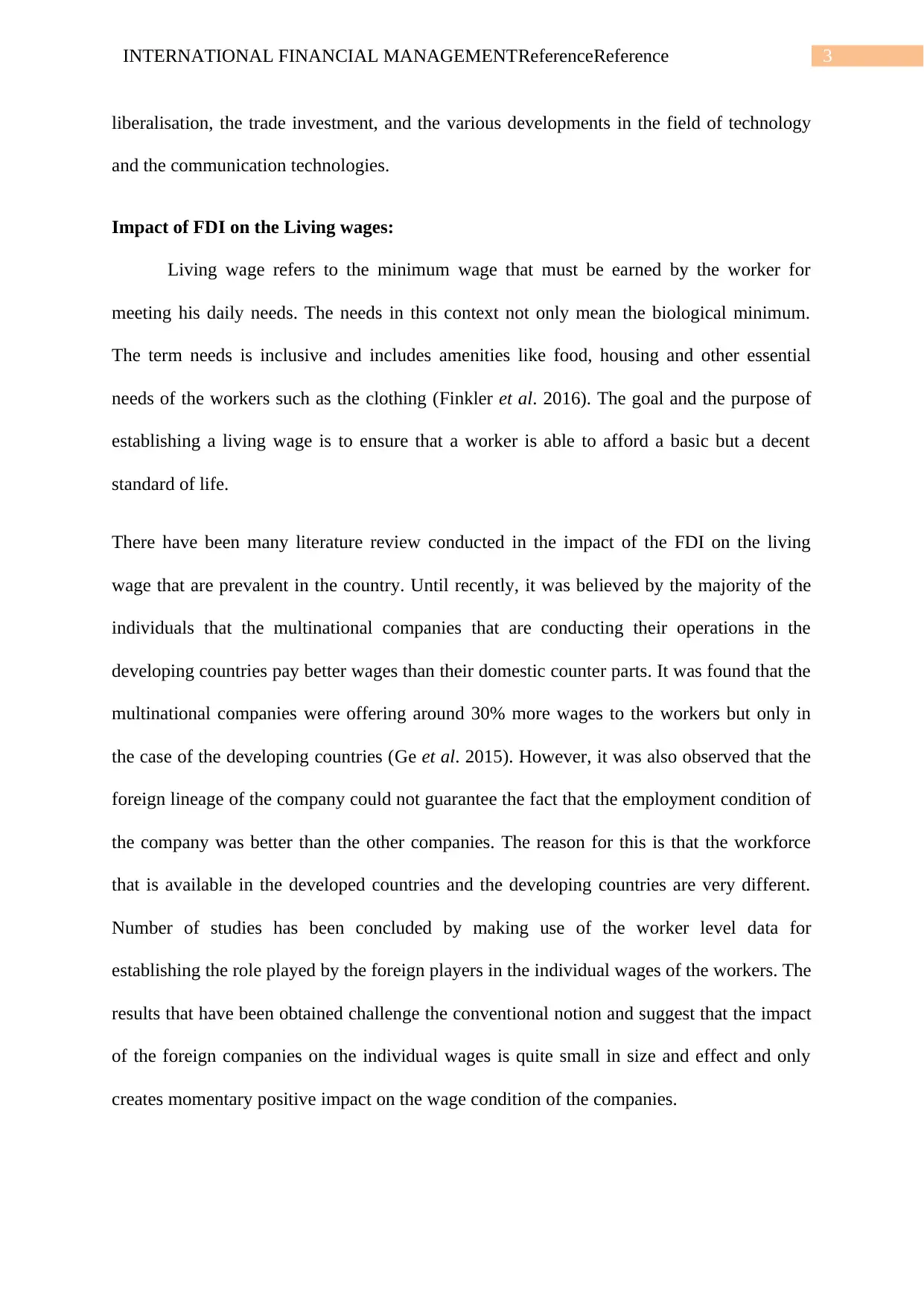
3INTERNATIONAL FINANCIAL MANAGEMENTReferenceReference
liberalisation, the trade investment, and the various developments in the field of technology
and the communication technologies.
Impact of FDI on the Living wages:
Living wage refers to the minimum wage that must be earned by the worker for
meeting his daily needs. The needs in this context not only mean the biological minimum.
The term needs is inclusive and includes amenities like food, housing and other essential
needs of the workers such as the clothing (Finkler et al. 2016). The goal and the purpose of
establishing a living wage is to ensure that a worker is able to afford a basic but a decent
standard of life.
There have been many literature review conducted in the impact of the FDI on the living
wage that are prevalent in the country. Until recently, it was believed by the majority of the
individuals that the multinational companies that are conducting their operations in the
developing countries pay better wages than their domestic counter parts. It was found that the
multinational companies were offering around 30% more wages to the workers but only in
the case of the developing countries (Ge et al. 2015). However, it was also observed that the
foreign lineage of the company could not guarantee the fact that the employment condition of
the company was better than the other companies. The reason for this is that the workforce
that is available in the developed countries and the developing countries are very different.
Number of studies has been concluded by making use of the worker level data for
establishing the role played by the foreign players in the individual wages of the workers. The
results that have been obtained challenge the conventional notion and suggest that the impact
of the foreign companies on the individual wages is quite small in size and effect and only
creates momentary positive impact on the wage condition of the companies.
liberalisation, the trade investment, and the various developments in the field of technology
and the communication technologies.
Impact of FDI on the Living wages:
Living wage refers to the minimum wage that must be earned by the worker for
meeting his daily needs. The needs in this context not only mean the biological minimum.
The term needs is inclusive and includes amenities like food, housing and other essential
needs of the workers such as the clothing (Finkler et al. 2016). The goal and the purpose of
establishing a living wage is to ensure that a worker is able to afford a basic but a decent
standard of life.
There have been many literature review conducted in the impact of the FDI on the living
wage that are prevalent in the country. Until recently, it was believed by the majority of the
individuals that the multinational companies that are conducting their operations in the
developing countries pay better wages than their domestic counter parts. It was found that the
multinational companies were offering around 30% more wages to the workers but only in
the case of the developing countries (Ge et al. 2015). However, it was also observed that the
foreign lineage of the company could not guarantee the fact that the employment condition of
the company was better than the other companies. The reason for this is that the workforce
that is available in the developed countries and the developing countries are very different.
Number of studies has been concluded by making use of the worker level data for
establishing the role played by the foreign players in the individual wages of the workers. The
results that have been obtained challenge the conventional notion and suggest that the impact
of the foreign companies on the individual wages is quite small in size and effect and only
creates momentary positive impact on the wage condition of the companies.
Paraphrase This Document
Need a fresh take? Get an instant paraphrase of this document with our AI Paraphraser
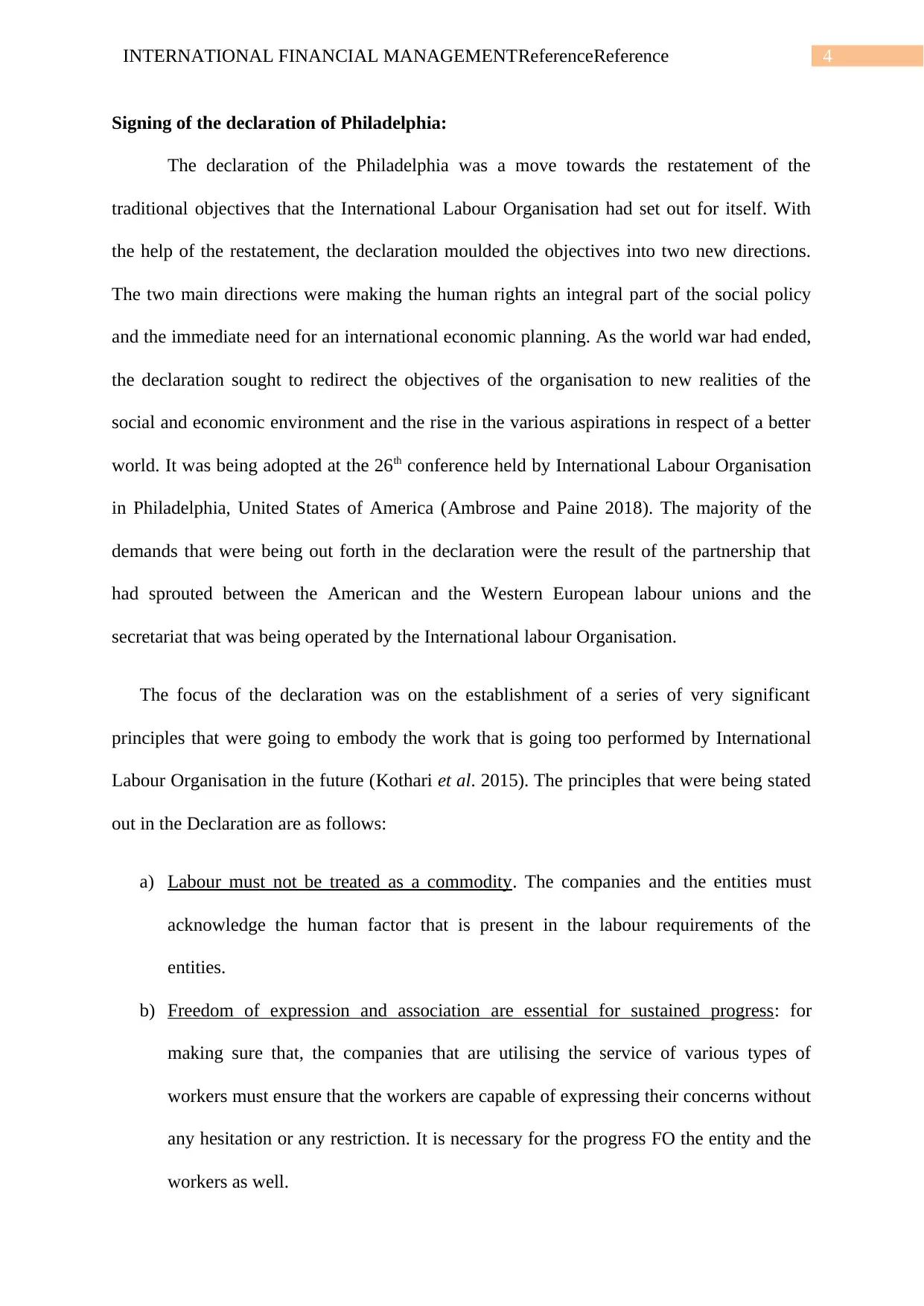
4INTERNATIONAL FINANCIAL MANAGEMENTReferenceReference
Signing of the declaration of Philadelphia:
The declaration of the Philadelphia was a move towards the restatement of the
traditional objectives that the International Labour Organisation had set out for itself. With
the help of the restatement, the declaration moulded the objectives into two new directions.
The two main directions were making the human rights an integral part of the social policy
and the immediate need for an international economic planning. As the world war had ended,
the declaration sought to redirect the objectives of the organisation to new realities of the
social and economic environment and the rise in the various aspirations in respect of a better
world. It was being adopted at the 26th conference held by International Labour Organisation
in Philadelphia, United States of America (Ambrose and Paine 2018). The majority of the
demands that were being out forth in the declaration were the result of the partnership that
had sprouted between the American and the Western European labour unions and the
secretariat that was being operated by the International labour Organisation.
The focus of the declaration was on the establishment of a series of very significant
principles that were going to embody the work that is going too performed by International
Labour Organisation in the future (Kothari et al. 2015). The principles that were being stated
out in the Declaration are as follows:
a) Labour must not be treated as a commodity. The companies and the entities must
acknowledge the human factor that is present in the labour requirements of the
entities.
b) Freedom of expression and association are essential for sustained progress: for
making sure that, the companies that are utilising the service of various types of
workers must ensure that the workers are capable of expressing their concerns without
any hesitation or any restriction. It is necessary for the progress FO the entity and the
workers as well.
Signing of the declaration of Philadelphia:
The declaration of the Philadelphia was a move towards the restatement of the
traditional objectives that the International Labour Organisation had set out for itself. With
the help of the restatement, the declaration moulded the objectives into two new directions.
The two main directions were making the human rights an integral part of the social policy
and the immediate need for an international economic planning. As the world war had ended,
the declaration sought to redirect the objectives of the organisation to new realities of the
social and economic environment and the rise in the various aspirations in respect of a better
world. It was being adopted at the 26th conference held by International Labour Organisation
in Philadelphia, United States of America (Ambrose and Paine 2018). The majority of the
demands that were being out forth in the declaration were the result of the partnership that
had sprouted between the American and the Western European labour unions and the
secretariat that was being operated by the International labour Organisation.
The focus of the declaration was on the establishment of a series of very significant
principles that were going to embody the work that is going too performed by International
Labour Organisation in the future (Kothari et al. 2015). The principles that were being stated
out in the Declaration are as follows:
a) Labour must not be treated as a commodity. The companies and the entities must
acknowledge the human factor that is present in the labour requirements of the
entities.
b) Freedom of expression and association are essential for sustained progress: for
making sure that, the companies that are utilising the service of various types of
workers must ensure that the workers are capable of expressing their concerns without
any hesitation or any restriction. It is necessary for the progress FO the entity and the
workers as well.
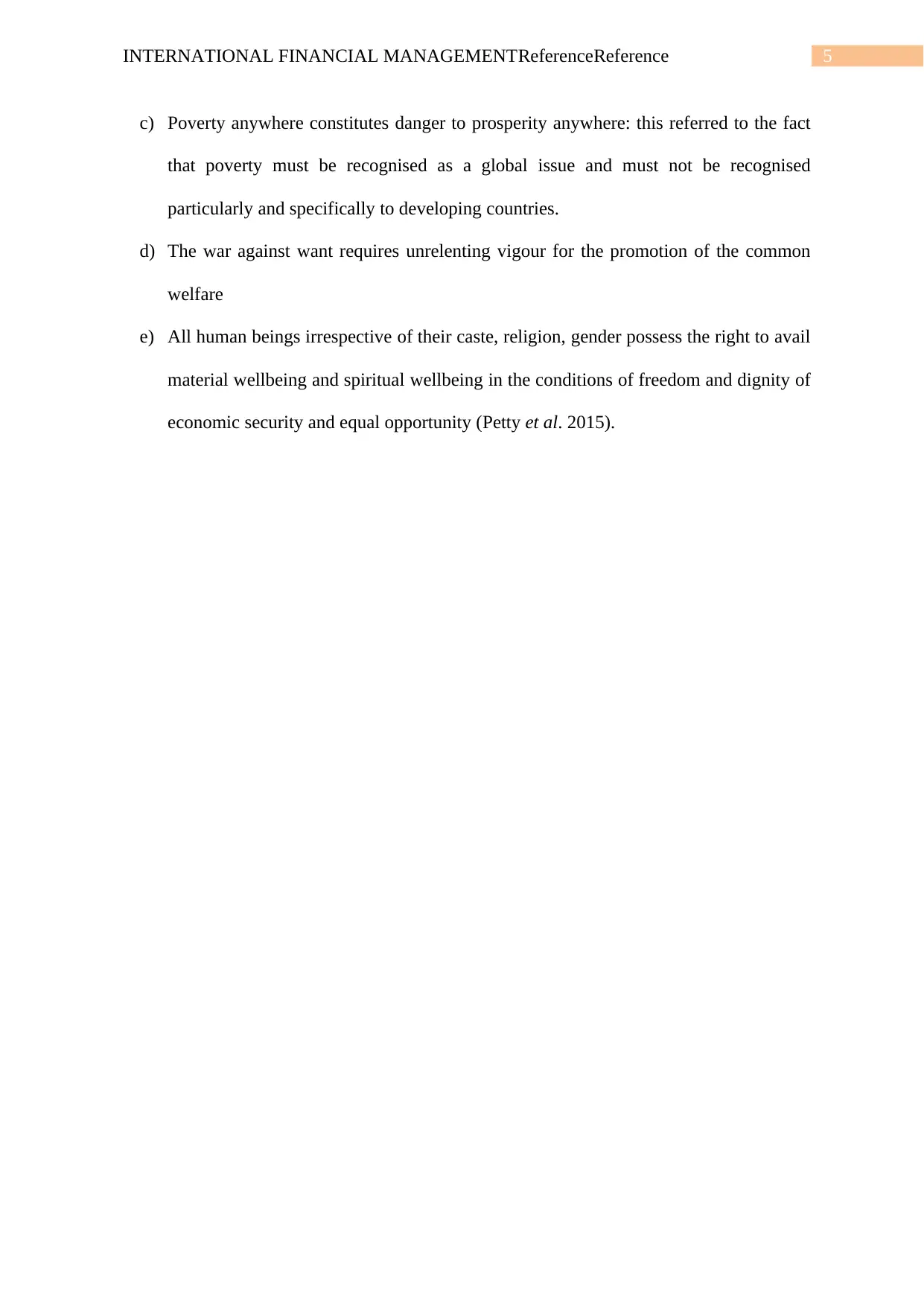
5INTERNATIONAL FINANCIAL MANAGEMENTReferenceReference
c) Poverty anywhere constitutes danger to prosperity anywhere: this referred to the fact
that poverty must be recognised as a global issue and must not be recognised
particularly and specifically to developing countries.
d) The war against want requires unrelenting vigour for the promotion of the common
welfare
e) All human beings irrespective of their caste, religion, gender possess the right to avail
material wellbeing and spiritual wellbeing in the conditions of freedom and dignity of
economic security and equal opportunity (Petty et al. 2015).
c) Poverty anywhere constitutes danger to prosperity anywhere: this referred to the fact
that poverty must be recognised as a global issue and must not be recognised
particularly and specifically to developing countries.
d) The war against want requires unrelenting vigour for the promotion of the common
welfare
e) All human beings irrespective of their caste, religion, gender possess the right to avail
material wellbeing and spiritual wellbeing in the conditions of freedom and dignity of
economic security and equal opportunity (Petty et al. 2015).
⊘ This is a preview!⊘
Do you want full access?
Subscribe today to unlock all pages.

Trusted by 1+ million students worldwide
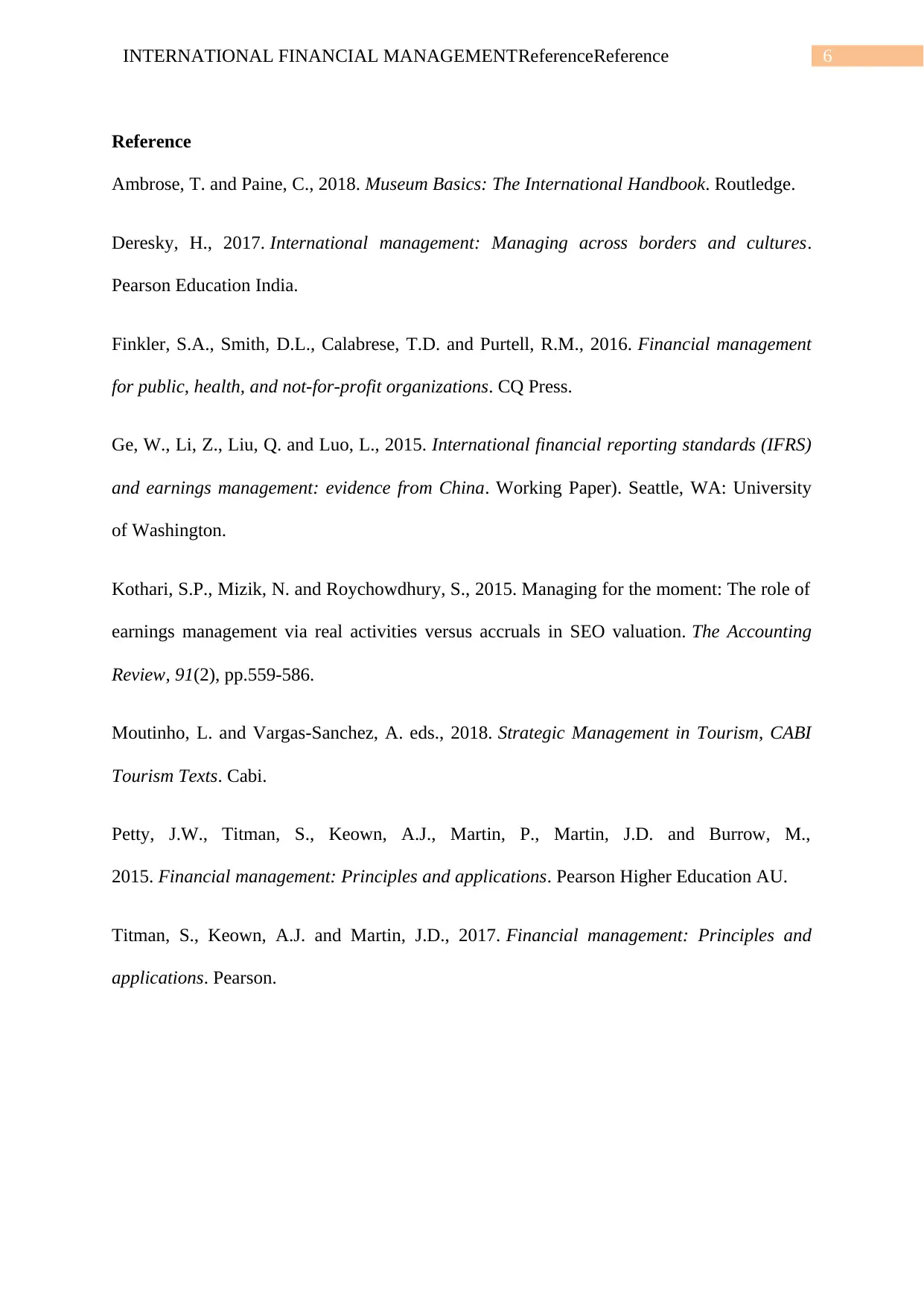
6INTERNATIONAL FINANCIAL MANAGEMENTReferenceReference
Reference
Ambrose, T. and Paine, C., 2018. Museum Basics: The International Handbook. Routledge.
Deresky, H., 2017. International management: Managing across borders and cultures.
Pearson Education India.
Finkler, S.A., Smith, D.L., Calabrese, T.D. and Purtell, R.M., 2016. Financial management
for public, health, and not-for-profit organizations. CQ Press.
Ge, W., Li, Z., Liu, Q. and Luo, L., 2015. International financial reporting standards (IFRS)
and earnings management: evidence from China. Working Paper). Seattle, WA: University
of Washington.
Kothari, S.P., Mizik, N. and Roychowdhury, S., 2015. Managing for the moment: The role of
earnings management via real activities versus accruals in SEO valuation. The Accounting
Review, 91(2), pp.559-586.
Moutinho, L. and Vargas-Sanchez, A. eds., 2018. Strategic Management in Tourism, CABI
Tourism Texts. Cabi.
Petty, J.W., Titman, S., Keown, A.J., Martin, P., Martin, J.D. and Burrow, M.,
2015. Financial management: Principles and applications. Pearson Higher Education AU.
Titman, S., Keown, A.J. and Martin, J.D., 2017. Financial management: Principles and
applications. Pearson.
Reference
Ambrose, T. and Paine, C., 2018. Museum Basics: The International Handbook. Routledge.
Deresky, H., 2017. International management: Managing across borders and cultures.
Pearson Education India.
Finkler, S.A., Smith, D.L., Calabrese, T.D. and Purtell, R.M., 2016. Financial management
for public, health, and not-for-profit organizations. CQ Press.
Ge, W., Li, Z., Liu, Q. and Luo, L., 2015. International financial reporting standards (IFRS)
and earnings management: evidence from China. Working Paper). Seattle, WA: University
of Washington.
Kothari, S.P., Mizik, N. and Roychowdhury, S., 2015. Managing for the moment: The role of
earnings management via real activities versus accruals in SEO valuation. The Accounting
Review, 91(2), pp.559-586.
Moutinho, L. and Vargas-Sanchez, A. eds., 2018. Strategic Management in Tourism, CABI
Tourism Texts. Cabi.
Petty, J.W., Titman, S., Keown, A.J., Martin, P., Martin, J.D. and Burrow, M.,
2015. Financial management: Principles and applications. Pearson Higher Education AU.
Titman, S., Keown, A.J. and Martin, J.D., 2017. Financial management: Principles and
applications. Pearson.
1 out of 7
Related Documents
Your All-in-One AI-Powered Toolkit for Academic Success.
+13062052269
info@desklib.com
Available 24*7 on WhatsApp / Email
![[object Object]](/_next/static/media/star-bottom.7253800d.svg)
Unlock your academic potential
Copyright © 2020–2025 A2Z Services. All Rights Reserved. Developed and managed by ZUCOL.





